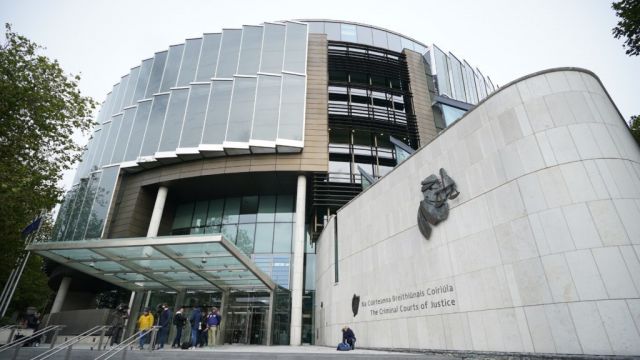A call claiming explosives had been planted in the Minister for Justice's house was traced back to a number associated with the man accused of making this call, a jury has heard.
Michael Murray (52), formerly of Seafield Road, Killiney, Dublin, has pleaded not guilty to one count of knowingly making a false report giving rise to an apprehension for the safety of someone else while he was imprisoned in the Midlands Prison, Portlaoise on March 7th 2021.
Earlier in the trial, the jury heard that an anonymous caller claiming to be from the Irish National Liberation Organization had rung the Samaritans claiming explosives had been planted at the home of the Minister for Justice, Helen McEntee.
It is the State's case that Mr Murray made this call, which was later traced to the Midlands Prison. Mr Murray denies any wrongdoing.
The trial has heard evidence that gardaí conducted searches and no explosives were found.
On the third day of the trial on Thursday, the court heard from Noel Reilly, who worked in the IT department of the Irish Prison Service at the time of the call.
Mr Reilly told Sean Gillane SC, prosecuting, that he was asked to prepare a report showing outgoing calls to the Samaritans made from Midlands Prison when the bomb threat was made.
Mr Reilly said an outgoing call from the prison matching the time that the bomb threat was made, as well as its duration, was made using a unique prisoner number associated with Mr Murray.
He explained that before a call can be made from within an Irish prison, prisoners must enter a number given to them to access the phone system.
He said his “observation would be” that Mr Murray made the phone call to the Samaritans at the exact time.
He also told Mr Gillane that when a prisoner makes a personal phone call it is recorded.
Recordings
Calls to the Samaritans and solicitors are not recorded, but they are logged in the prison's database, the court heard.
Mr Reilly said prisoners would be aware of which kind of calls would and would not be recorded.
Under cross-examination, Mr Reilly agreed with Garett Baker SC, defending, that it was possible that someone else could use another prisoner's phone number.
He agreed with Mr Baker that a prisoner could contact the Samaritans using someone else's identification number and that Mr Reilly was relying on numbers rather than actual identities or CCTV footage.
Mr Baker put it to Mr Reilly that the system was “prehistoric” and is “patched up as you go along”. Mr Reilly agreed that the system is old, but said it is “continually improving, and any issues that may arise are looked into and dealt with”.
Defence counsel also put to Mr Reilly that at the time of the bomb threat there had been an issue in the system where prisoners were able to make multiple calls to their solicitors each day when it should have been limited to once daily.
Mr Reilly accepted this, adding that the issue was fixed a few weeks later, on March 22nd, 2021.
“There will always be bugs that will be identified and rectified,” he said.
The court also heard of a previous issue in the system in 2010, where conversations between prisoners and solicitors had been recorded. This had happened after prisoners had entered the contact details of their solicitors under the spots for personal contacts.
The trial continues before Judge Patricia Ryan and a jury.







